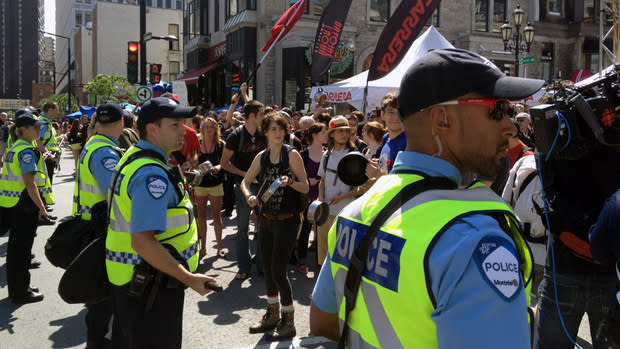Police arrest 28 in Montreal's F1 protests

Montreal police have arrested more than two dozen protesters for trying to disrupt the Canadian Grand Prix parties.
Police say of the 28 people who were arrested Saturday night, 16 will be facing criminal charges, which could include assault, assault with a weapon, assault against a police officer, uttering threats and vandalism.
Much of the confrontation centred on Crescent Street, where riot police lined up to prevent protesters from advancing. Police used tear gas and pepper spray during an altercation that culminated in several arrests during the third consecutive day of Grand Prix festivities.
At least four police vehicles were vandalized and at least one business had its windows broken.
A taxi driver could face charges for fleeing the scene of an accident. Police say he got out of his cab to argue with a crowd of protesters and his vehicle rolled down a hill, injuring three people.
The nightly student protest partly rolled out from Place Émilie-Gamelin. Montreal police came out in full force, as they will for the duration of the weekend amid threats of continued disruptions leading up to Sunday's race. A heavy police presence is also expected on the city's subway system.
Earlier Saturday afternoon, demonstrators had gathered near Concordia University denouncing what they described as the exorbitant demonstration of wealth by race spectators as well as the province's contributions to the event.
The federal, provincial and municipal government provide $15 million annually to bring the race to the city. The high-spending attendees can bring in as much as $100 million for the local economy.
Protesters banged pots and pans as they marched near Crescent Street in a demonstration that was peaceful for much of the day. Some protesters drew attention to their cause with a naked bike ride. Others marched straight to the heart of the Grand Prix celebrations downtown, accompanied by the now-familiar clang of discontent.
"The Grand Prix is a capitalist enterprise and I don't like capitalism," one protester told CBC News.
Although the demonstrators did turn heads, they did not necessarily change minds.
"I don't agree with it at all. I think it's part of the city and they should relax," said one race attendee.
Others visitors, like Steven Marshall of Toronto, were more sympathetic.
"As long as nobody is getting hurt and as long as the demonstrations remain peaceful, I have the belief that people should be able to assemble and make their voices heard," he said.
Student leaders insist the grand prix disruptions are not their doing, and that the anger in the streets is reflective of a growing sense of dissatisfaction with the provincial government.
"A lot of ambiguity was cultivated by the government and I think that was the strategy — to put the blame on the student associations for actions that were organized by parallel groups."
Security has been stepped-up on the metro, where three people were questioned for allegedly carrying fireworks on the transit system on Saturday.
Some protest groups are calling the Grand Prix an elitist event and one group is calling on like-minded people to pack the metro system Sunday, making it difficult for fans to get to the race.
"We're all going to the Grand Prix at the same time just to see how many people can enter the subway. Upon arriving on the island, you can turn around and start again, just for fun," the Convergence of Anti-Capitalist Struggles (CLAC-Montreal) said on Facebook.
On Friday, 12 people were arrested when protesters tried to crash the F1 festivities on Crescent Street.

